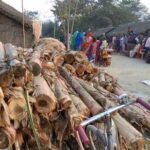On the 100th episode of Mann ki Baat, PM Modi reconnected with and lauded the efforts of Manipur’s Bijiyashanti Tongbram, who turns lotus stems into clothes. This is a boost not just to this designer, but more importantly to the entire sustainable textile chain in the country.
On the 100th episode of Mann ki Baat, Prime Minister Narendra Modi looked back at some of the highlights of the show’s iconic more than eight years’ run. He spoke to Manipur’s Bijiyashanti Tongbram, from Thanga village near Loktak, Bishnupur, who is using lotus stem fibre to weave delicate mufflers, stoles and facemasks.
Turning a completely unused part of the lotus plant, which is found in abundance in the Loktak freshwater lake, into beautiful garments, she has made a mark for herself, the Indian Prime Minister noted.
In May 2019, Bijiyashanti started spinning yarn from lotus stems and weaving neckties, mufflers, etc., with the help of a handful of women from her locality. Subsequently, she set up an enterprise ‘Sanajing Sana Thambal”, which now has 30 women, including her. “I want to expand with 100 women,” she told Modi in a telephonic conversation on the show.
On the Prime Minister’s question on whether everyone knows about lotus stem fibre, Bijiyashanti said, “Yes, sir…now it is very popular. I have got a market…from USA also…they want to buy in bulk also. From this year, I plan to export my products as Made in India lotus fibre. I want to make sure my products reach all over the globe.”
What Is Lotus Fibre?
According to Textilecoach.net, stems of lotus plant are collected when the flowers of the lotus are in full bloom. The deep pink flower consists of best quality fibres.
From the petals, the fibre is extracted and then from the fibre, yarns are spun into fabrics either in the mills or by hand.
According to designers, as the count is low, one has to interlace it well to make it usable. Handspun fabrics can cost 2-3 times the actual cost owing to the human efforts.




